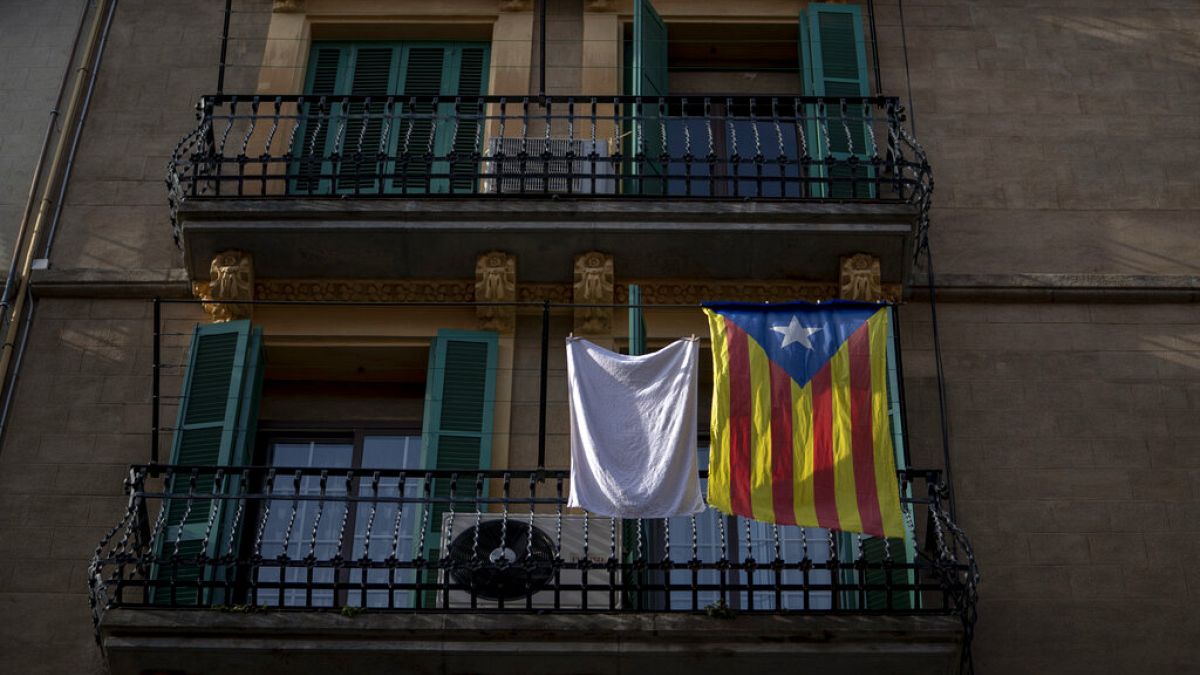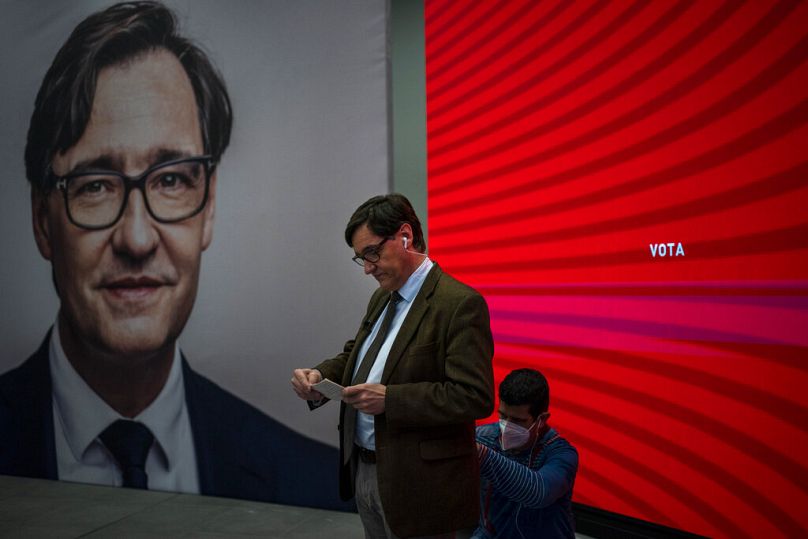Optimism, a political calculation or democratic necessity?
Optimism, a political calculation or democratic necessity?
That is the debate around Catalonia's regional election, which is controversially going ahead this Sunday (February 14) despite the COVID-19 pandemic.
Why is it controversial?
The COVID-19 pandemic has disrupted the electoral calendar in multiple countries since its outbreak in Europe around a year ago.
France was forced to delay the second round of its municipal elections from March to June. Poland postponed its presidential elections. Spain's Basque Country and Galicia held elections in July. All came as the first wave had begun to recede.
The election in Catalonia comes as Spain, which has lost 63,700 people to COVID-19, wrestles with a third wave.
In light of a worsening situation, the regional government proposed, in agreement with other political parties, to postpone the elections — scheduled for February 14 — to May in the hope that the figures would improve by then.
The Socialist Party of Catalonia did not outright object to the new date but analysts close to the party mounted a case against it arguing that health reasons cannot prevail over the constitution, which establishes that "elections will take place between thirty days and sixty days after the end of the mandate".
The party, which was doing well in the polls, feared that parties campaigning for Catalonia's independence from Spain would take advantage of the extended election period to form coalitions and reorganise themselves.
They also feared their candidate, Salvador Illa, then Spain's health minister, would be undermined as he dealt with the pandemic.
The case was brought to Catalonia's high court, which ruled that elections should go ahead as planned, if proper sanitary measures are put in place.
What has happened to Catalonia's independence movement?
Spain was plunged into its biggest crisis for decades when the north-east region of Catalonia declared independence in 2017 following a referendum that Madrid considered illegal.
Many of the leaders of Catalonia at that time are now either in jail or have fled the country to avoid prosecution.
The bid to break away from the rest of Spain saw Madrid strip Catalonia of its autonomy for months.
The new leader, Quim Torra, in favour of Catalonia's independence, was then disqualified from holding office because he refused to remove a pro-independence symbol from a government building around the time of Spain's general election.
Now polls are predicting that the Socialists could triumph in Catalonia for the first time in a decade on Sunday, breaking pro-independence parties' grip on power.
Salvador Illa: From civil servant to a household name
As the head of Spain’s response to the coronavirus pandemic, he was transformed from a mostly unknown, bespectacled civil servant into a household figure who won both accolades and criticism for his level-headed, soft-spoken approach.
Polls show that Illa, 54, has helped boost the Socialist Party’s popularity, and rivals are targeting him as the man to beat for the job of Catalonia's president.
Illa is convinced that the pandemic has made some pro-secession Catalans refocus on health and the common good.
“There are episodes in the life of a nation, a people, or a community, when despite having very different political positions and opinions, it is necessary that we come together. The pandemic is one of these moments,” Illa told The Associated Press.
“I sense that in Catalonia the majority want to turn the page after 10 wasted years,” he said. “(They) want to dedicate our energies to the problems we face today, to protecting our health, reviving our economy and making sure no one gets left behind.”
With political loyalties fragmented on both sides of the Catalan independence debate, no party is expected to win an outright majority of 68 seats in the 135-seat regional parliament.
Illa’s chances of becoming the first non-separatist leader of Catalonia since 2010 will rest on his Socialists doing well and getting support from other parties. He has ruled out forming a government with any pro-independence parties.
But there's also a strong chance that pro-secession forces could retain power after a race that is too close to call and whose outcome will depend on deal-making that could take weeks.
Critics of Illa believe Spain's response to the pandemic was too slow and disorganized and claim he used the Health Ministry, which he left last month, as a platform to launch his campaign.
What health measures are being put in place for Sunday's election?
In anticipation of the TSJC upholding the election date, the Catalan government had already prepared some sanitary protocols with postal voting heavily promoted.
The number of voting centres has also been multiplied to reduce crowding, necessitating Catalonia to borrow ballot boxes from other regions. Voting is favoured in spacious, well-ventilated premises with where distancing of 2.5 metres is possible.
FC Barcelona's Nou Camp will also be converted into a gigantic polling station.
A health and safety officer has been created, who will organise and supervise the measures in the polling stations.
People manning the voting centres will, for instance, be provided with PPE similar to those donned by frontline health workers that they will have to put on during the last hour of the voting day. That's when COVID-19 patients and people self-isolating will cast their ballot.
The man in charge of organising the election tells Euronews voting "will be safer than going on the underground, safer than going to your workplace, safer than going to the shops."
"Unless staying home, it’s going to be the safest place in Catalonia that day," promises Ismael Peña López, the Director-General of Citizen Participation and Electoral Processes for the Catalan government.
Empty polling stations?
Still, many people are afraid to participate in the process. Polling stations in Spain are staffed by ordinary citizens selected through a lottery system who can only be excused for a limited number of reasons including being over 65, ill, disabled or pregnant.
Jorge Carretero, a scientist at the Institute for High Energy Physics in Barcelona, told Euronews he and his family have been careful since the start of the pandemic, limiting contacts with anybody outside their immediate bubble.
But he received the letter from the lottery system, and says: "We don't see even my friends and then suddenly I have to go to a place and see hundreds of people."
"It’s something that’s mandatory, I’m not the only one. 90,000 people receive this letter. I’m not an at-risk person, so OK, let’s go, let’s do it, but I don’t understand why they have to do it now."
"Let’s try to do it fast, with a few people. With everything open, windows, doors, and everything fast. Then cross the fingers."
According to provisional figures gathered by Radio Televisión Española, 24,000 people called to man polling stations have presented excuses for not participating — 30 per cent of the total, an unprecedented figure.
Even so, the Catalan government guarantees that 99 per cent of the polling stations have enough staff members — thanks to a large number of substitutes and some repetitions of the draws. It also guarantees that the results will be known that same night, in the face of fears that desertions from the polling stations could force a delay in the publication of the results.
Peña López is sure the vote will go ahead smoothly.
“We’ve been working with all the political parties since July on this, so there’s much consensus on what we have to do, we have to invite people to vote and try to provide guarantees that voting is safe," he says.
"Right now we think the turnout will be pretty much regular, and there will be no problems with the legitimacy and the results.”
However, some polls predict a record abstention rate. Others, somewhat more optimistic, estimate that turnout will be around 58 per cent, low, but far from the record low of 54.8 per cent that marked Jordi Pujol's fourth re-election in 1992.
Every weekday at 1900 CET, Uncovering Europe brings you a European story that goes beyond the headlines. Download the Euronews app to get an alert for this and other breaking news. It's available on Apple and Android devices.

